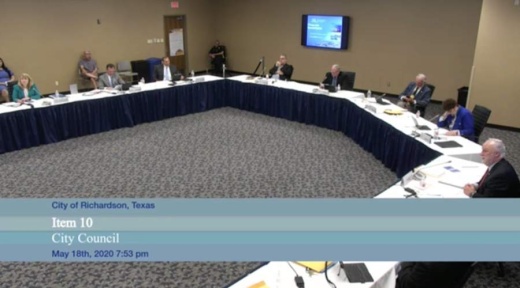The city’s general fund, which is sustained largely through property and sales taxes, will suffer a loss of roughly $11.1 million, which is $1 million less than originally projected. This is because March sales tax revenue came in better than expected, Assistant City Manager Shanna Sims-Bradish explained at the May 18 council meeting.
According to the state comptroller’s office, sales tax collection increased by $202,539 to $3.7 million in March, representing a 5.71% increase year over year.
Despite the favorable outcome in March, the city is still projecting a $5.1 million loss in sales tax revenue, or 13.4% less than originally budgeted, Sims-Bradish said.
“At the beginning of the year, sales tax was tracking pretty well,” she said. “After May, we are projecting to have a gap or a delta between what we are projecting and what we are budgeting.”
The city has also missed out on Municipal Court fines and Civic Center rental fees, among other items, Sims-Bradish said.
“In a repressed economy you don’t see as much building activity happening,” she said of the loss in permitting fees.
The city was able to reduce its general fund expenditures by 5.5% to $7.3 million by departments reducing operating expenses to only essential needs, Sims-Bradish explained.
To break even, the city needs to come up with roughly $3 million. Some additional expenses may be offset by federal Coronavirus Aid, Relief, and Economic Security Act funding, Sims-Bradish said.
Contingency plans are in place to prevent a shortage in general fund revenue. Options include evaluating street and alley projects, moving certain expenses to other funds, changing staffing and compensation, and pursuing COVID-19 relief grants.
Since the last budget update, losses in the hotel fund have increased. Its two major revenue sources, hotel/motel taxes and Eisemann Center sales, have been hit hard by a slowdown in the tourism industry, Sims-Bradish said.
March hotel-motel tax payments were down 49% year over year in March, she said, and the city is not expecting payments to improve until July. Overall, the city expects to lose $2 million in hotel-motel tax revenue.
“We are definitely seeing reduced occupancy in all of our hotels as well as the ability of our hotels just to pay,” she said.
Eisemann Center revenue is projected to be down more than 50% year over year, Sims-Bradish said. The city is awaiting further guidance from the governor before it reopens the facility.
Given these factors, the city has upped its hotel fund revenue loss by about $1 million to $3.2 million. It has slashed a slew of expenditures to lessen the blow but is still considering other options, such as reductions in departmental expenses or changes to staffing and compensation.
Impacts to the city’s water and sewer fund and its solid waste fund remain unchanged since the last budget update.
The city had previously projected to break even in its golf fund; however, due to activity at Sherrill Park, it is now anticipating a fund increase of $140,000.
Sims-Bradish warned council members that there is still a great deal of uncertainty surrounding the fiscal impacts of the coronavirus. All estimates could change based on the length and severity of the pandemic, she said.
“For us, there is a real question of, ‘What does the economic recovery look like for our community?,” she said. “How strong is it? How long is it?”
Council will hear detailed projections for each operating fund in June. Budget workshops will be held in July.





